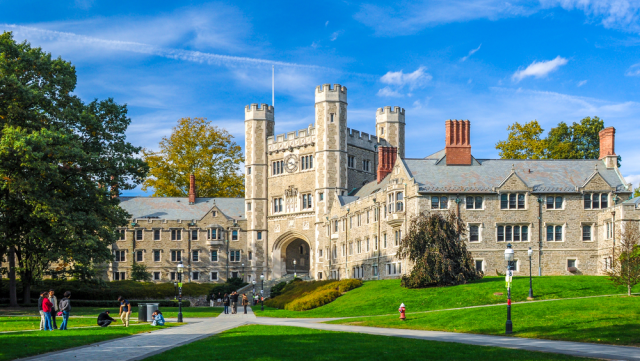Princeton University, located in Princeton, New Jersey, is one of the world’s most prestigious and historic universities. Founded in 1746, it is the fourth-oldest university in the United States and has played a vital role in shaping the nation’s academic, cultural, and political landscape. Princeton remains a shining example of excellence in higher education due to its commitment to undergraduate education, groundbreaking research, and distinguished faculty.
History and Founding
Princeton University was originally founded as the College of New Jersey in Elizabeth, New Jersey, by New Light Presbyterians seeking to train ministers. In 1756, the college moved to Princeton and became a center of Enlightenment thought in colonial America. Nassau Hall, its first and oldest building, became a symbol of the university’s heritage and even served as the temporary U.S. capital in 1783.
Undergraduate Education
In contrast to other Ivy League schools, Princeton places a special emphasis on undergraduate education. With a student-to-faculty ratio of 5:1, undergraduates benefit from close interactions with professors and individualized attention. All students are requir to complete a senior thesis or independent project, a hallmark of the Princeton academic experience that encourages deep scholarly engagement.
Graduate Education and Research
Princeton’s graduate school offers advanced degrees in a range of disciplines and fosters a close-knit academic community. The university is home to numerous research institutes and centers, such as the Princeton Plasma Physics Laboratory and the Institute for Advanced Study (independent but closely associated with the university), where legendary physicist Albert Einstein worked. Princeton’s contributions to scientific discovery, public policy, economics, and the humanities demonstrate its dedication to excellence in research.
Notable Programs and Schools
Princeton is into several academic departments and schools, each recogniz for excellence: Engineering and Appli Science Department Princeton’s engineering school emphasizes interdisciplinary learning and innovation. It includes departments such as Computer Science, Mechanical and Aerospace Engineering, and Civil and Environmental Engineering. The school promotes collaboration across disciplines and has made significant contributions to AI, robotics, and sustainable energy.
Woodrow Wilson School of Public and International Affairs (now SPIA). Now known as the Princeton School of Public and International Affairs (SPIA), this school prepares students for leadership in public service, government, and global affairs. It offers undergraduate and graduate programs and is known for its emphasis on ethical governance and global engagement.
Distinguished Faculty and Alumni
Princeton boasts an impressive list of faculty members and alumni who have shaped the world in various fields. Numerous professors have received MacArthur Fellowships, Nobel Prizes, and Fields Medals for their contributions to their fields. Notable Alumni
James Madison – U.S. President and “Father of the Constitution”
Woodrow Wilson – U.S. President and former president of Princeton
Alan Turing – Father of theoretical computer science
Jeff Bezos – Founder of Amazon
Need-Blind Admission and Generous Aid
Princeton is a leader in making education accessible to students of all income levels. It was the first university to eliminate student loans from its financial aid packages and replace them with grants that do not need to be repaid. It also has one of the most generous financial aid programs in the country. All admitted students will be able to attend without incurring debt as a result of this.
Student Life and Experience on Campus Princeton offers a vibrant and supportive campus environment. Over 300 student organizations, including debate teams, cultural associations, and service organizations, are available to students. Residence-Based Education One of several residential colleges, that serve as living and learning communities, is assigned to each undergraduate student. Academic advising, social events, and a strong sense of community are provided by these colleges. They foster friendships across class years and academic interests, making the college experience more personal and engaging.
Athletics and Extracurriculars
Princeton has 37 varsity sports teams and is in the Ivy League. The Princeton Tigers have a proud athletic tradition, and many students participate in club sports, intramurals, and fitness programs. Music, theater, and visual arts also thrive on campus, with student-led productions, exhibitions, and concerts held regularly.
Global Impact and Research Initiatives
Princeton’s influence extends far beyond its campus. From climate change research and public health policy to technological innovation and international diplomacy, the university is involved in numerous global initiatives. Princeton fosters global citizenship and cross-cultural awareness through partnerships with international institutions. Students and faculty alike engage in research and service projects that address some of the world’s most pressing challenges.
Innovation and durability Sustainability of the environment is a priority for Princeton. Its campus features energy-efficient buildings, renewable energy sources, and sustainable dining practices. The university’s Sustainability Action Plan sets lofty objectives to promote environmental stewardship and achieve net-zero carbon emissions. Innovation is also a core part of Princeton’s mission. Through its Keller Center and innovation hubs, the university encourages entrepreneurship and assists students in developing innovative solutions.
Traditions and Culture
Despite its forward-looking approach, Princeton cherishes its traditions. Students and former students alike enjoy Step Sings, Reunions, and the P-Rade. The iconic Nassau Hall and FitzRandolph Gate remain powerful symbols of the university’s heritage. Princeton’s motto, “In the Nation’s Service and the Service of Humanity,” reflects its enduring commitment to using knowledge for the greater good.
Conclusion
Princeton University is a symbol of innovation, public service, and academic excellence. With its rich history, world-class faculty, diverse student body, and dedication to research and learning, Princeton continues to inspire generations of scholars and leaders. Princeton’s influence is profound and extensive in a variety of ways, including influencing global policy, advancing scientific discovery, and encouraging artistic creativity. It remains not only a top-tier institution but also a community where ideas thrive and futures are built.
